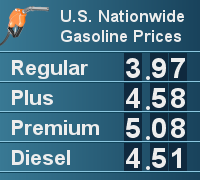The United States is the largest importer of Venezuela’s oil exports. In 2008, the United States imported 1.19 million barrels per day (bpd) of crude oil and petroleum products from Venezuela, down from 1.36 million bpd in 2007. Historically, Venezuela has been one of the most important suppliers of foreign oil to the United States, but that importance has been diminishing, especially under Venezuela President Hugo Chavez. In 1960, Venezuela’s share of U.S. oil imports stood at 50%, but Venezuela now bounces between being the fourth and fifth largest supplier to the US, supplying only 9% of total US oil imports in 2008.
According to data provided by the US Energy Information Administration (EIA), the statistical arm of the Department of Energy, sales of Venezuelan crude oil and byproducts to the United States amounted to 1,008,000 barrels per day in September 2010 -- a 12% fall in Venezuelan oil exports to the United States compared to the amount of oil and byproducts exported in September 2009, which averaged 1,146,000 bpd.
Venezuelan oil exports slightly declined (14,000 bpd) in September compared to August 2010, when the daily averaged was 1,022,000 bpd exported to the US.
From January to September, Venezuelan oil exports to the US averaged 1,005,000 bpd, while during the same period of last year they averaged 1,119,000 bpd.
Despite the cumulative decline, Venezuela was the fifth crude oil and byproducts supplier to the United States in September.
The list was led by Canada, which exported 2,475,000 bpd, followed by Mexico (1,256,000 bpd); Nigeria (1,174,000 bpd); Saudi Arabia (1,093,000 bpd) and Venezuela, which exported 1,008,000 bpd.
Oil accounts for more than one-third of Venezuela's gross domestic product, more than half of government revenue and about nine-tenths of the country's exports. Venezuela's President Hugo Chavez and Venezuelan Energy and Oil Minister Rafael Ramirez have been arguing for a $100 per barrel, saying it is a “fair price” for crude in today’s world.
“It’s a fair price because it would allow us to recover the value of our natural resource and sustain the important investments that all oil-producing countries must make to maintain production capacities,” said Ramirez, who is also president of state-owned Petroleos de Venezuela S.A (PDVSA).
“We know the price of oil is being affected by factors apart from so-called oil-market fundamentals; in other words, financial speculation, the weakness of the dollar, all those elements that are closely tied to a perception of economic problems,” Ramirez said.
Despite the drastic fall in price between 2008-2009, from $140 to $35 per barrel, the minister hailed the “significant recovery” since then.
Venezuela President Hugo Chavez said last week that oil should be above $100 a barrel because the US dollar "is increasingly worthless."
Venezuela, a founding member of OPEC and one of the globe’s top oil exporters, says it produces 2.9 million barrels per day, though OPEC and the IEA put that figure closer to 2.3 million barrels a day.
The country says it plans to increase output to 4.15 million bpd in 2015 and to 6.85 million bpd starting in 2021 thanks to several promising projects in the massive, heavy-oil Orinoco Belt in eastern Venezuela, according to Ramirez.
| Commodities | ||
|---|---|---|
| Crude Oil | 89.10 | - 0.01% |
| Natural Gas | 4.72 | - 0.30% |
| Gasoline | 2.46 | +0.12% |
| Heating Oil | 2.66 | + 0.37% |
| Gold | 1342.96 | - 0.21% |
| Silver | 27.48 | +0.12% |
| Copper | 4.30 | + 0.87% |
| Quotes delayed 15 min. | » Add to your site | |

| Crude Oil Price by OIL-PRICE.NET © | ||||||||||||||||||||||||||||||||
| ||||||||||||||||||||||||||||||||
 0.01 0.01%
0.01 0.01%
No comments:
Post a Comment